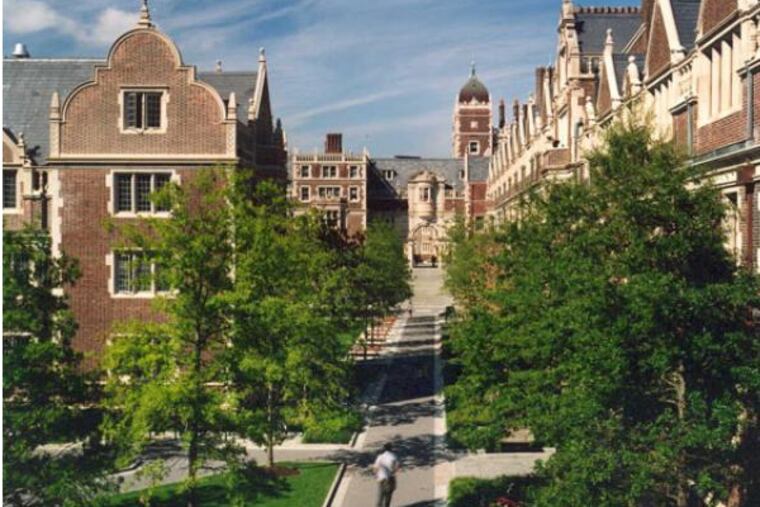Cautious colleges prepare for the possibility of Ebola
As Ebola concerns mount, many campuses across the region are suspending university-sponsored travel to affected countries, training health center employees to deal with an outbreak, and monitoring the health of students arriving from regions hit by the illness.

As Ebola concerns mount, many campuses across the region are suspending university-sponsored travel to affected countries, training health center employees to deal with an outbreak, and monitoring the health of students arriving from regions hit by the illness.
"Even if the probability of an Ebola outbreak in this country remains remote, it is critically important that we take proactive measures to be fully prepared," Amy Gutmann, president of the University of Pennsylvania, wrote in an e-mail to the Penn community last week, outlining steps the Philadelphia university is taking.
Across the region, schools are on high alert.
Villanova University has established a task force and "Ebola action plan," and ordered protective gear for health workers, including gowns and eye shields.
At West Chester University, staff have practiced "donning and doffing" protective equipment.
Haverford College is looking to identify possible quarantine areas on campus.
And health professionals at Rowan University in Glassboro are meeting daily this week to develop procedures to deal with the possibility of an infected patient on campus.
College campuses are a natural place for precautionary steps. They are home to international students, some of whom hail from the countries under warning by the Centers for Disease Control and Prevention - Sierra Leone, Liberia, and Guinea. Universities also send researchers and students abroad to study in those countries.
"Being proactive is a good thing, and coming up with a preparedness plan is important for any outbreak, but for a major outbreak like this, it's very important," said Eileen Farnon, associate professor of medicine in the infectious diseases section at Temple University's School of Medicine.
Even campuses that know of no potential exposure are taking precautions.
"With our community returning to campus from last week's fall break, and with many people traveling this past week, in an abundance of caution we communicated with all students, faculty and staff, along with the parents of students, to review information about Ebola virus and Villanova's efforts," spokesman Jonathan Gust said.
Some campuses have had to deal much more directly with the issue. Yale University hospitalized a graduate student who showed Ebola symptoms shortly after returning from Liberia. The student subsequently tested negative. Syracuse University has come under criticism from its student newspaper for withdrawing a speaking invitation to a Washington Post photographer who returned from Liberia more than three weeks ago.
Area campuses began to look at the issue as early as last summer. Bryn Mawr College brought home one week early students who were studying in Ghana even though the virus was not present there, the school's president, Kimberly Wright Cassidy, said.
"We were on more the conservative side, and in this case, that's where we want to be," she said.
The college had to pay $6,000 to get flights switched for the five students, college spokesman Matt Gray said, adding that trip insurance would not cover the cost of the switched flights because the virus was not present in Ghana.
As the fall semester began, campuses identified and monitored the health of students who had come from affected countries.
The University of the Sciences screened for exposure seven students from countries affected by Ebola, spokesman Brian Kirschner said.
"We will be following up with those students regarding travel plans and/or any interactions with visiting family," he added.
St. Joseph's University monitored a handful of students and told them to report any symptoms; none did, said spokeswoman Kelly Welsh. Temple took similar steps with a handful of students, with no problems reported, said spokesman Brandon Lausch.
At the University of Delaware, officials from the student health unit contacted 11 students from Nigeria at the start of school and asked them to check their temperature twice a day for 21 days - the incubation period for symptoms to show, said spokeswoman Andrea Boyle Tippett.
No students reported a problem, she said. Nigeria is not one of the CDC warning areas, but cases of Ebola have been reported there. On Monday, the World Health Organization declared the country free of Ebola.
In her e-mail, Gutmann wrote that Penn was continuing to monitor student, faculty, and staff travel and that no one had arrived from the affected areas in the last 21 days. Penn has recommended that students, faculty, and staff follow the CDC's recommendation that U.S. citizens defer unnecessary travel to Guinea, Liberia, and Sierra Leone.
Some schools went further.
(Clarification: The following paragraph had contained incorrect information provided by Drexel University and has been corrected).
Drexel does not currently have any academic programs located in the affected countries of West Africa. It has suspended program development for the three impacted West Africa countries and will not approve proposed travel by faculty and students to these countries until further notice.
The next hurdle for campuses will be holiday break.
Lausch said Temple would offer accommodations for students from affected countries who cannot or do not want to go home for winter break.
Clarification: The original version of this story gave incorrect information about Drexel University's efforts to prepare for Ebola. The university has suspended travels and program development only in the three countries currently under CDC warning for Ebola — Guinea, Liberia, and Sierra Leone. The incorrect information was provided by the university.
215-854-4693 @ssnyderinq